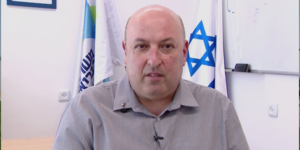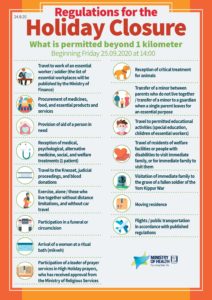Prof. Itamar Grotto says second nationwide shutdown can be effective against pandemic – although long-term success depends on compliance with regulations
Israel will reopen very slowly from its current nationwide coronavirus lockdown, following an exit strategy that is completely different from that followed earlier in the year, a top Health Ministry official says.
Prof. Itamar Grotto, the ministry’s deputy director general, told The Media Line that lockdowns were “very effective” and warned that the biggest challenge lay in bringing Israel’s skyrocketing infection rate under control.
“I’m not sure that all the lockdown measures are required, but since compliance by the public was not [good] enough, this lockdown was inevitable,” Grotto said, adding that he did not believe the strict confinement would last more than two weeks.
Health Ministry Deputy Director General Itamar Grotto. (Screengrab/Knesset TV)
Sweeping confinement restrictions went into effect across the country on Friday afternoon. They are expected to last at least until after the Jewish holidays end on October 10.
“Now the important issue is to go with reopening much more slowly than we did before,” he explained. “Now we have much more data… so we can do it in a smarter way.”
Now the important issue is to go with reopening much more slowly than we did before
In March and April, Israel’s first nationwide quarantine helped reduce the number of cases to just a few dozen a day. However, in early May, measures were rapidly eased, with shops and restaurants immediately reopening and children returning to school, allowing parents to go back to work.
The move resulted in an immediate resurgence in cases, with outbreaks in many schools.
On Saturday, ahead of the Jewish holiday of Yom Kippur, the Health Ministry reported that a record 8,315 coronavirus cases had been diagnosed during the previous 24 hours, representing a 13.4% positivity rate for testing.
Of Israel’s 68,788 active cases, 749 are in serious condition, 267 are in moderate condition and the rest have mild or no symptoms.
The ministry says that gatherings and mass prayers over Rosh Hashana, the Jewish New Year, may have led to the current spike.
Give the gift of hope
We practice what we preach:
accurate, fearless journalism. But we can't do it alone.
- On the ground in Gaza, Syria, Israel, Egypt, Pakistan, and more
- Our program trained more than 100 journalists
- Calling out fake news and reporting real facts
- On the ground in Gaza, Syria, Israel, Egypt, Pakistan, and more
- Our program trained more than 100 journalists
- Calling out fake news and reporting real facts
Join us.
Support The Media Line. Save democracy.
In addition to having learned its lesson about hasty re-openings, Grotto says the country has massively increased its testing capacity, with more than 60,000 tests being administered on an average weekday.
“I think the biggest challenge is that we have to decrease the number of patients,” Grotto said, pointing to the fact that many coronavirus wards have reached capacity or near-capacity.
I think the biggest challenge is that we have to decrease the number of patients
“In the next two or three weeks, people should strictly comply with the regulations,” he said. “We can give some hope to the people that after this step, we will have a different exit strategy… and we’ll reach winter with a low level” of new cases.
This poster explains some of the regulations in place since a full lockdown went into effect on Friday. (Health Ministry)
Some countries appear to have successfully contained the virus.
Taiwan, with a population of 23 million, has had only 500 confirmed cases and seven deaths since the pandemic began.
The island’s leaders responded quickly by monitoring flights coming out of Wuhan, on the Chinese mainland, starting last December. In March, they banned the entry of all foreign nationals. The public also began wearing masks before the disease’s methods of transmission were understood.
But comparing Israel to Taiwan is like comparing apples to oranges, Grotto says.
“I think we can take something from Taiwan, South Korea and Japan, but it’s very hard to compare countries because of the differences in culture,” he said.
I think we can take something from Taiwan, South Korea and Japan, but it’s very hard to compare countries because of the differences in culture
“I’m talking to people from Taiwan and Japan to see what we can [learn] from them, but it seems that most of their success is related to their culture and the fact that people are very compliant with regulations,” Grotto said, adding that things are a bit different in Israel.
“We cannot change the culture and we don’t want to do that, so we have to adapt the steps we are taking to Israeli culture and Israeli behavior,” he said.
Two of the tools Israel is relying on are artificial intelligence (AI) and big data. Some healthcare professionals are utilizing these technologies to identify early deteriorations and to help monitor patients without doctors or nurses having to be physically present.
“It’s being used in some of the hospitals, but it’s not something [in] general [use] yet,” Grotto said.
He spoke to The Media Line after an online conference organized jointly by JLM-BioCity, a Jerusalem “bio-community” non-profit, and IGTCloud, a leading hi-tech community made up of companies, startups, venture capital firms and academics who specialize in AI, big data and cloud computing.
The event, held last Wednesday, was sponsored by the Azrieli College of Engineering and BioJerusalem, a Jerusalem Development Authority initiative.
Titled “How Big Data and AI Can Fight the COVID-19 Crisis,” the virtual conference featured an array of distinguished speakers, including Grotto and Dr. Paul B. Rothman, medical faculty dean at Johns Hopkins University and chief executive officer of Johns Hopkins Medicine (JHM).
Dr. Hamutal Shahar, chief executive officer of JLM-BioCity, told The Media Line that the healthcare arena is beginning to adopt cutting-edge technologies.
“I think that COVID-19 will enhance this,” said Shahar, an expert in clinical development and operations. “I agree that there is a gap between what can be done and what is [being] done. There are amazing tools that we can use.”
I agree that there is a gap between what can be done and what is being done. There are amazing tools that we can use
Avner Algom, chief executive officer of IGTCloud, says these tools can help policy-makers and health experts make informed decisions about the distribution of patients across health facilities to avoid overburdening individual hospitals, and predict which patients are at high risk of developing more severe symptoms from COVID-19.
“The technology absolutely already exists,” Algom told to The Media Line. “The issue [lies] with managing the data and using the relevant application to make the right decisions.”



